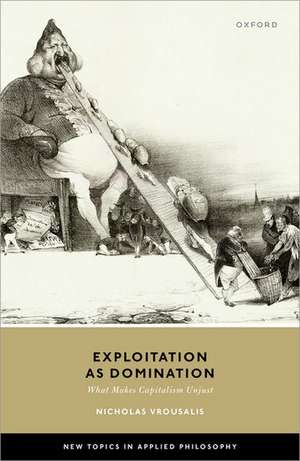Exploitation as Domination: What Makes Capitalism Unjust: New Topics in Applied Philosophy
Autor Nicholas Vrousalisen Limba Engleză Hardback – 30 noi 2022
Preț: 473.21 lei
Preț vechi: 654.59 lei
-28% Nou
Puncte Express: 710
Preț estimativ în valută:
90.58€ • 98.42$ • 76.13£
90.58€ • 98.42$ • 76.13£
Carte disponibilă
Livrare economică 19-25 martie
Livrare express 15-21 martie pentru 113.06 lei
Preluare comenzi: 021 569.72.76
Specificații
ISBN-13: 9780192867698
ISBN-10: 0192867695
Pagini: 224
Dimensiuni: 160 x 242 x 16 mm
Greutate: 0.47 kg
Editura: OUP OXFORD
Colecția OUP Oxford
Seria New Topics in Applied Philosophy
Locul publicării:Oxford, United Kingdom
ISBN-10: 0192867695
Pagini: 224
Dimensiuni: 160 x 242 x 16 mm
Greutate: 0.47 kg
Editura: OUP OXFORD
Colecția OUP Oxford
Seria New Topics in Applied Philosophy
Locul publicării:Oxford, United Kingdom
Recenzii
It is to the great credit of this book, and its author, that they focus attention on such questions, and provide a clear rationale for their pursuit.
In Exploitation as Domination, Nicholas Vrousalis brings philosophical discussions of exploitation full circle back to capitalism.
The book makes a powerful case for the major conceptual connections that it proposes, and it will most likely serve in the years to come as both an instructive example of the rigor and breadth with which novel research in the philosophy of socialism can be conducted.
Vrousalis' book brings us to the brink of [...] a revived critique of political economy, rather than a new theory of distributive justice.
This book explores the conceptual interrelationships between human "exploitation" and "domination." ...This book is extremely well written and well organized.
the best and most comprehensive alternative conception of exploitation currently on offer.
A decade ago, purely distributive approaches [to exploitation] were dominant. The challenges Vrousalis has raised for these accounts have had a major impact. It is now largely taken for granted... that exploitation requires something more than maldistribution. Exploitation as Domination makes that point abundantly clear.
Nicholas Vrousalis's central claims about exploitation in Exploitation as Domination are clear and intuitively compelling: exploitation is self-enrichment through the domination of others, and it is inherent to capitalism.
In Exploitation as Domination, Nicholas Vrousalis brings philosophical discussions of exploitation full circle back to capitalism.
The book makes a powerful case for the major conceptual connections that it proposes, and it will most likely serve in the years to come as both an instructive example of the rigor and breadth with which novel research in the philosophy of socialism can be conducted.
Vrousalis' book brings us to the brink of [...] a revived critique of political economy, rather than a new theory of distributive justice.
This book explores the conceptual interrelationships between human "exploitation" and "domination." ...This book is extremely well written and well organized.
the best and most comprehensive alternative conception of exploitation currently on offer.
A decade ago, purely distributive approaches [to exploitation] were dominant. The challenges Vrousalis has raised for these accounts have had a major impact. It is now largely taken for granted... that exploitation requires something more than maldistribution. Exploitation as Domination makes that point abundantly clear.
Nicholas Vrousalis's central claims about exploitation in Exploitation as Domination are clear and intuitively compelling: exploitation is self-enrichment through the domination of others, and it is inherent to capitalism.
Notă biografică
Nicholas Vrousalis is an Associate Professor in Practical Philosophy at Erasmus University, Rotterdam. He read economics and Trinity Hall, Cambridge, and obtained his doctorate in political philosophy from the University of Oxford. In 2015 Vrousalis published his first book, The Political Philosophy of G. A. Cohen, with Bloomsbury. His research interests include distributive ethics, democratic theory, and the history of political thought, with an emphasis on Kant, Hegel, and Marx.









